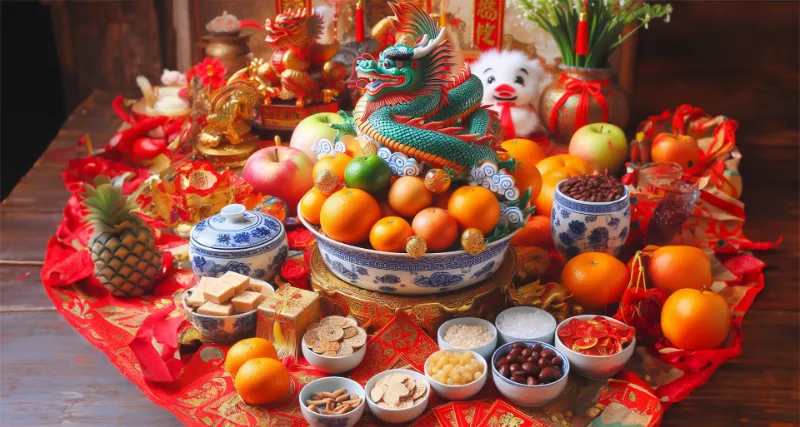
Story of the Yellow God of Wealth: Symbolism and Merits
The Yellow God of Wealth is one of the commonly worshiped wealth deities in Tibetan Buddhism, an incarnation of the Wealth-Granting Heavenly King among the Four Heavenly Kings. In addition to being the leader of the Four Heavenly Kings, he is also the god of great fortune and wealth. The Yellow God of Wealth, named Jambhala, wears a five-buddha crown and adorns celestial garments with lotus ornaments. With a yellow complexion and a large belly, he sits half cross-legged on a lotus throne, with his right leg naturally hanging down and stepping on a conch. In his right hand, he holds the wish-fulfilling fruit, while the left hand grasps the mongoose that spews treasures. Sincerely worshiping the Yellow God of Wealth, especially for those who practice Buddhism according to the scriptures, can secure his protection, ensuring abundant wealth and preventing the hardships of poverty.
Relationship Between Yellow God of Wealth (Jambhala) and Wealth
The wish-fulfilling fruit corresponds to the Bijapuraka in the worldly sense, which is a fruit in India with medicinal properties, such as anti-inflammation, cough suppression, fever reduction, and even anti-cancer effects. Ancient Hinduism highly respected the Bijapuraka tree, believing it to be inhabited by many gods. According to Grandmaster JinBodhi, the wish-fulfilling fruit held by the Yellow God of Wealth is, in fact, a Divine fruit and a great treasure, not only having the ability to eliminate diseases and grant health but also possessing protective properties against evil spirits and demons.
[The ratel, also known as honey badger, belongs to the Mustelidae family, with Mellivora capensis as its scientific name.] Despite its cute appearance and small size, the mongoose is strong-willed. When hunting, it is super-agile, preying on various creatures such as mice, birds, bees, and even venomous scorpions. Its favorite meal, however, is poisonous snakes; it is virtually invulnerable to all toxins. Everything can be its food, so when seeing it, even tigers, lions, and crocodiles use caution. Being tamed by the Yellow God of Wealth and held in his hand, the mongoose is very powerful. Grandmaster JinBodhi once said that the mongoose can transform anything it eats into treasures and wealth multiplied a thousandfold. “When the Yellow God of Wealth needs it to spit out treasures, he simply needs to pinch its belly, and all worldly treasures can be spat out of its mouth.”
The conch symbolizes the jewels of the sea. Grandmaster JinBodhi explains that the ocean is filled with abundant treasures. By stepping on the conch, the Yellow God of Wealth signifies his ability to retrieve treasures from the sea and bestow them upon those in need. Additionally, as a Heavenly king, he views the cosmic space as his ocean. Therefore, he can obtain treasures from the Heavens, Earth, and seas whenever he wishes. He truly lives up to his title as the Wealth-Granting Heavenly King.
Furthermore, the Wealth-Granting Heavenly King serves as the guardian deity of the North. From an energy perspective, Grandmaster JinBodhi explains that in Ancient China, most emperors chose to establish their capitals in the North, and it was rare to see capitals established south of the Yangtze River. Although a few dynasties established their capitals in the South, those dynasties proved to be unsustainable. The reason is that the mysterious Kunlun Mountains form a powerful energy field which was referred to as “the Great Dragon Vein” by ancient people. The ability of an emperor to govern such a vast country depended on their mastery of the Dragon Vein. During the Ming dynasty, there was a Divine monk named Yao Guangxiao who was proficient in both Buddhist and Taoist practices. He possessed profound knowledge of astronomy and geography. It was due to his keen analysis of Dragon Veins that he assisted Emperor Zhu Di in determining the auspicious orientation for the imperial palace, establishing the capital in Beijing, facing north. Grandmaster JinBodhi believes that the Earth’s powerful energy resides in the North, gradually diminishing as one moves southward. This phenomenon is observed not only in Asia but also in the Americas and especially in Europe. Strong energy implies abundant wealth. Thus, the guardian deity of the North, the Wealth-Granting Heavenly King, is the deity associated with prosperity.
Merits and Benefits of Worshiping the Yellow God of Wealth
Grandmaster JinBodhi states that the Yellow God of Wealth once made a vow before the Buddha to protect Buddhist practitioners from the sufferings of poverty during their spiritual journey. He promised to ensure that those on the path of awakening would not lose their way due to a lack of resources, allowing all destined sentient beings in poverty to attain wealth and resources, thereby increasing their virtue, wisdom, and even promoting their health and longevity.
To establish a connection with the Yellow God of Wealth, Grandmaster JinBodhi teaches The Heart Mantra of the Yellow God of Wealth (Om Jambhala Jalendraya Svaha), encourages everyone to sincerely worship the Yellow God of Wealth, recite his mantra, maintain benevolent thoughts, and be compassionate and kindhearted. By doing so, one can easily resonate with the Yellow God of Wealth. When one sustains this sincere connection through chanting the mantra, wealth and good fortune shall appear when needed.
Moreover, Grandmaster JinBodhi has introduced exquisite thangkas of the Yellow God of Wealth for the public to purchase. These thangkas can be carried in wallets or pockets, placed in cars or offices, or prominently displayed in shops. There is also a chance for people to receive blessings and protection by donating to the building of golden statues of the Yellow God of Wealth.
Making Offerings to the God of Wealth

To resonate with a God of Wealth, we can sculpt his golden statues, regularly chant his mantras with visualization, and engage in frequent worship. When offering to the God of Wealth, selecting suitable items not only expresses respect and sincerity but also brings joy to the deity. Consequently, the gods may bestow blessings, enhancing financial fortune. Therefore, choosing the right offerings is crucial.
According to folk belief, different offerings represent different meanings. For instance, offering gold and silver treasures may bring wealth, while offering food ensures that descendants will have sustenance. Offering clean water symbolizes purifying one’s negative karma, as well as one’s actions, speech, and mind. Offering fresh flowers may result in a beautiful appearance, leading to good karma and good luck. However, customs may vary across regions, and individuals should choose offerings based on specific circumstances.
Furthermore, practitioners of Tibetan Buddhism believe that when making offerings to the buddhas and bodhisattvas, one should choose what they personally like because buddhas and bodhisattvas are beyond preferences. If the worshiper can offer their most cherished treasure or food, the offering would best express their reverence and sincerity. However, if the offering is intended for a deity, selecting what the deity likes will make the deity happy to grant blessings to the worshiper.
For the Gods of Wealth, different deities may have different preferences. In Tibetan Buddhism, it is believed that the Yellow God of Wealth likes alcohol, so alcoholic beverages may be offered. The White God of Wealth favors water and bathing, while the Red God of Wealth enjoys radishes and bananas. However, for ordinary people, it is commonly believed that the God of Wealth likes sweets. Therefore, offerings typically include candies, pastries, red dates, and sweet fruits such as longan, sweet orange, persimmon, melon, and pineapple. It is essential to avoid bitter, sour, and spicy foods.
Grandmaster JinBodhi reminds everyone that regardless of the chosen offering, the most crucial factor lies in the sincerity of the offeror’s heart. Being arrogant and failing to show due respect when offering will create problems, regardless of the item offered. Conversely, a person with a genuine and respectful heart, who engages in regular acts of kindness and assistance to others, aligns well with the God of Wealth, and such an individual can receive the deity’s protection and blessings, even without the ability to offer luxurious items.
Parting Wisdom
Although money is not everything, living in a material world makes financial wellbeing crucial. Grandmaster JinBodhi states that Buddhism is primarily a means of survival, and secondly, a means of liberation. This highlights the greatness and practicality of Buddhism. Buddhism emphasizes that wealth comes from virtuous actions and merit. In other words, an individual’s accumulation of merit determines the extent of their wealth. Therefore, on the path to financial prosperity, it is essential not to blindly pursue wealth but to focus on accumulating virtue and good deeds.
The three Gods of Wealth are the symbols of compassion, righteousness, wisdom, and courage. These qualities not only bring them wealth but also have the potential to transform ordinary individuals into celestial beings. May you be inspired by the wisdom herein, and traverse the virtuous path to improving your financial fortune.
Extra Reading: Unveiling the Origin of the God of Wealth: How Does the Mysterious Guardian Deity of Wealth Affect Your Financial Fortune? (Part 1)